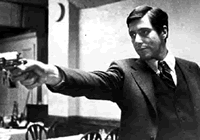They're sharp, and because of such can make daring decisions about what kinds of articles to publish.
Like write a whole article about the semicolon.
I had no objection to this at all; oh hey look, i'm quite an advocate of the semicolon myself; although i'm sure I season with it far too often. I dont fancy myself an expert grammarian, and as many will see in this sloppy side project, I make mistakes too.
But here's the deal: an article about a semicolon can be quite tongue-in-cheek and very clever.
It can also be seen as insanely pretentious.
And here is where the writer makes himself look like a silly, silly pretentious ass:
Correction: February 19, 2008, Tuesday An article in some editions on Monday about a New York City Transit employee's deft use of the semicolon in a public service placard was less deft in its punctuation of the title of a book by Lynne Truss, who called the placard a ''lovely example'' of proper punctuation. The title of the book is ''Eats, Shoots & Leaves'' -- not ''Eats Shoots & Leaves.'' (The subtitle of Ms. Truss's book is ''The Zero Tolerance Approach to Punctuation.'')
The whole snobby word nerd joke of the book is the blarring difference between

eats,

shoots and leaves
and

eats shoots and leaves
so sam roberts writes this peice about the importance of punctuation and botches a line about the importance of punctuation.
oh, sam.
checking to see how the phrase "foot-in-mouth" is supposed to be written (without confusing it with foot and mouth disease), i found out that there is in fact an award for dumb phrases (and an Ep by green day with the same title):
The Foot in Mouth award is awarded each year by the British Plain English Campaign for "a baffling comment by a public figure"
They're all quite lovely but i rather like:

"Reports that say that something hasn't happened are always interesting to me, because as we know, there are known knowns; there are things we know we know. We also know there are known unknowns; that is to say we know there are some things we do not know. But there are also unknown unknowns — the ones we don't know we don't know."

"I think that [the film] Clueless was very deep. I think it was deep in the way that it was very light. I think lightness has to come from a very deep place if it's true lightness."
nick underwood, teletubbies marketing
"in life, there are all colours and the Teletubbies are a reflection of that. There are no nationalities in the Teletubbies - they are techno-babies, but they are supposed to reflect life in that sense."
p.s. the hardest part of todays post:




picking the don's picture.

1 comment:
oh crap becky, this was phenomenal; I almost peed I laughed so hard. i love you.
Post a Comment